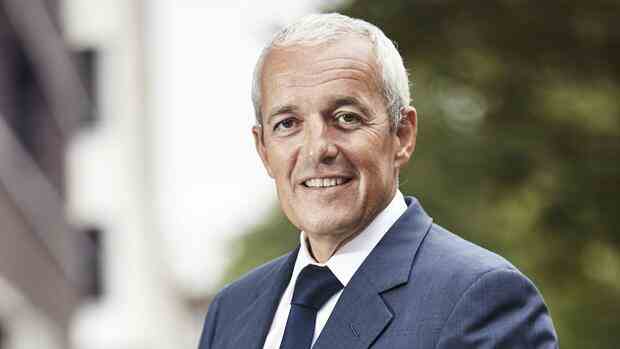The manager joined KKR in 1999.
(Photo: imago images / Carsten Dammann)
Frankfurt The European business of the American private equity group Kohlberg Kravis Roberts (KKR) is being reorganized. Johannes P. Huth, one of the most influential investment managers in the industry, is retiring from the operative business at KKR to the function of chairman, according to financial circles.
The 62-year-old Huth came to the US financial investor in 1999, worked from London for a long time and most recently managed the business from Paris. A spokeswoman for KKR declined to comment on the information.
In Germany, he made sure that KKR was visible in the media and accepted in politics. After the discussion started by former SPD leader Franz Müntefering about the “locust” image of private equity managers, he played a key role in improving their reputation again.
Above all, however, he made it clear to his New York headquarters that the German model of co-determination does not have to be an obstacle to deals, which he has shown in the case of the industrial group Kion, according to an industry insider.
Private equity funds buy medium-sized companies or parts of groups, restructure them over several years and then sell them on or list them on the stock exchange. The returns achieved are usually in the double digits.
Founded in 1976, KKR is considered the mother of all private equity firms. The industry’s dubious reputation in the 1980s and 1990s for cannibalizing companies to get as much profit as possible was even picked up in Hollywood: The book “Barbarians at the Gate” about the hard-fought takeover of the US tobacco company RJR Nabisco was filmed in 1989.
The younger generation of managers is taking on more responsibility
According to reports, the two KKR managers Philipp Freise, 49, and Mattia Caprioli, 48, have been appointed as Huth’s successors. As co-heads, they are responsible for the European private equity business and no longer report to Huth.
Freise likes to work with a so-called partnership model to involve families and foundations in the deals. Among other things, his focus is on media and tech deals, examples are the consumer researcher GfK, BMG, Scout 24 and the publishing house Axel Springer.
His colleague Caprioli joined KKR in 2001 from Goldman Sachs in London. In addition to overseeing numerous deals, he has made a name for himself as an expert on sustainability issues, which under the abbreviation ESG (Environmental, Social, Governance) stand for environmental and social criteria as well as good corporate governance.
The previous head of Europe, Huth, is cosmopolitan and a big supporter of European unity. The free trader showed little understanding for Brexit. Publicly he fought to remain in the EU. With the withdrawal from the operative business, Huth has more time for his numerous cultural and social commitments, in which he campaigns, among other things, for more equal opportunities in education.
Private equity industry is struggling with difficult framework conditions
The reorganization at KKR comes at a time of upheaval in the private equity industry. Above all, the financing for takeovers, which is more difficult to obtain, is affecting the managers, but higher interest rates for government bonds are also not making it easier to raise funds for new investment funds.
The business climate on the German private equity market stabilized at a very depressed level in the fourth quarter of 2022. The investor barometer of the KfW development bank and the BVK industry association rose by 9.2 points to minus 30.8 points. Although the assessment of the situation was again worse, this was more than compensated for by the improvement in business expectations. Nevertheless, the mood remained negative.
“Germany has swung onto a recessionary course, which is undoubtedly depressing the business climate on the German private equity market,” says Fritzi Köhler-Geib, chief economist at KfW. “The sharp rise in key interest rates, which will probably continue to rise, is challenging both for the typical private equity financing concept and for the target companies, which are also plagued by the sharp rise in energy costs.”
In view of the shortage of skilled workers, procurement bottlenecks and the energy crisis, many companies will be forced to reposition themselves. The probability that investment opportunities for private equity investors would arise here is high.
“We continue to see the greatest risks in the unclear development of the interest rate and inflation environment. The greatest opportunities, on the other hand, lie in undervalued market segments of attractive companies with long-term growth prospects. Tech, healthcare and data security are interesting here,” says Martina Schliemann from Asset Manager Harbourvest.
More: Financial investors face four challenges
